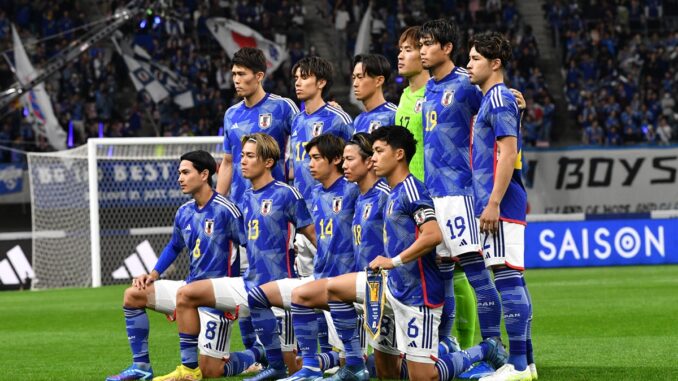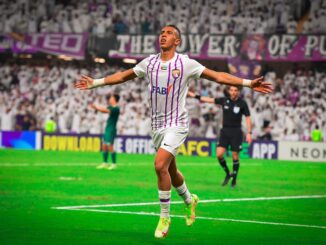
Officially, the road to the next FIFA World Cup in 2026 is already underway, after Asia’s lowest ranked nations played in the First Round of qualifiers in October.
But with the rest of Asia joining the fray in the Second Round, this feels like the moment when World Cup qualifying really begins.
On this week’s The Asian Game Podcast we were joined by Bassil Mikdadi from Football Palestine to preview the upcoming campaign, taking in all the major talking points.
On Palestine’s preparation’s amid the ongoing war
Bassil Mikdadi
You know, when there was the outbreak of war, you really assumed the worst, right. We have a lot of the scar tissue from bygone campaigns that were scuttled because the Israelis don’t let you travel (so) you have to withdraw.
I mean, Palestine’s 2010 World Cup campaign was over before it started because the team couldn’t travel. So they played one game undermanned against Singapore (but) couldn’t even play the return leg, because the Israeli authorities wouldn’t let them travel outside of Palestine.
So, having lived through that, I feared the worst that, not just the players, but the coaching staff themselves, who were also in the West Bank at the time, wouldn’t be able to get out. The positive aspect from all this is that the FA, in coordination with also the Jordanian FA and Prince Ali, managed to get the border open for long enough and get the players out. There was security coordination there to get all the players and the staff to the border and get them across the border.
So by the time they take to the field against Lebanon, in Sharjah in the UAE on Thursday night, it will have been over three weeks since they’ve gathered in Jordan and been training together. So I think overall from from a training perspective, from a preparation standpoint, given the circumstances it’s the best that you could hope for.
And they had, I think, a relatively successful camp in Jordan. I don’t have many details, I know they played against Al Salt, one of the local teams, the players that were in camp beat them three-nil. So that’s a good result.
The foreign-based players joined the national team in UAE, earlier today and yesterday, and those players are obviously going to play a very, very big difference because these players have been playing competitive matches all while this has all been ongoing.
So for them to take to the pitch, in spite of the ongoing war, will be something that they have normalised because they have been doing it for the past four weeks or so.
On Palestine’s squad
Bassil Mikdadi
So Palestine haven’t announced it, but I found out the names on the 26-man list to face Lebanon and Australia.
The makeup of the squad is as follows. So they took 20 players initially to Jordan, and then they’ve called that and replaced them with some players that are currently playing abroad. So the breakdown now is as follows. You’ve got 10 players that play abroad in leagues all over the world from Sweden to Belgium, to as far as India, to people who play in Egypt, in Kuwait, and Thailand, and Azerbaijan, Indonesia, and everything in between.
You’ve got three players that are currently unattached, but most recently played for clubs based abroad. And then you have three players that play in the Israeli football pyramid. So it takes takes us up to 16 players. The rest of the squad, the 10 other players, are players that play in the West Bank.
Probably from those players that play in the West Bank, I would expect only three to start or play any sort of roll. Those are the goalkeeper Rami Hamadeh, who I think is one to watch out for. (He’s) a guy that shouldn’t be playing in Palestine, he should be playing for big club in a big league in Asia or Europe, because I really think he is one of the best in Asia.
The right Musab Al-Battat who only came back to Palestine this year and was playing in Egypt before. I think he’s also somebody that will for sure, if he plays well, which given how consistent he is, he probably should be playing abroad somewhere very soon.
And then the number 10, or the most advanced central midfielder, Mahmoud Abu Warda. So I think those three players are the local players that will most likely start or play a significant role in these two games. Everybody else is based abroad.
And when you talk about Palestinian football, you’ve got to talk about the star boy, Oday Dabbagh. He turns 25 next month, he’s already in his third European season, he had a really, really good run of games in Portugal, I think he had something like 16 goals, and 14 starts over there. He now plays for Charleroi.
He’s also done well, although Charleroi’s struggling, he’s been involved in five goals, won a penalty, one assistant and three goals in this time at Charleroi.
Embed from Getty ImagesAnd I think it’s just a matter of time before he goes to one of the big five leagues in Europe. Super, super talented player, and doesn’t play for Palestine all that often. He played in three games in 2021, three games in 2022, has yet to play in 2023, for mostly injury related reasons.
But, I think if you just look at his statistics, you can see that this is a player that knows how to do the most difficult thing in football, which is score goals. And oh, yeah, he’s actually very technically adept, and a threat out on the wing as well, so a really great all around attacking player.
On China’s chances
Michael Church
I think China’s a toss of a coin. Really. I mean, they’ve not been in the best of form, they’ve continued to flatter to deceive, for God knows how long, and I I think we’ve just got such a difficult group being drawn with South Korea, Thailand and Singapore.
To be honest with you, across the vast majority of the nine groups, and I think this is certainly the case with with China’s group, I think across maybe eight of the nine groups, I think we can very comfortably predict who’s going to win the group. I think it’s very straightforward in very many of them, but I think the battle in most of the groups is for second place and for that second birth in the third round, and the automatic qualifying place, of course, for the Asian Cup, which we shouldn’t forget as well.
So I think the Koreans haven’t been particularly impressive since (Jurgen) Klinsmann took over, but I still think they’ve got considerably more than they will need to be able to overcome everybody in their group. And so I think that leaves China and Thailand really playing for second place, and that, to me, is really a toss of the coin because the Chinese really haven’t impressed at any point in the last however long – two years, three years maybe.
Embed from Getty Images(It’s) quite interesting, the squad that came out for these qualifiers, no Elkeson, which wasn’t a massive surprise. He’s not really been around much over this season since he since he went back to play in China. Tyias Browning is out, I think he’s injured. But Nico Yennaris has been brought back, which is quite an interesting one. He hasn’t played for China for a considerable period, I think it was 18 months or something that he was out with ankle injury issues.
But he’s been playing regularly for Beijing Guoan, and he’s back in the squad along with the other non-mainland China-born player who’s in the squad. Dai Wai Tsun, of course, who is from Hong Kong and many would prefer was still playing for Hong Kong. But he obviously made his decision and he decided to play for the Motherland as opposed to the Special Administrative Region of Hong Kong. But how they get on I mean, it’s anyone’s guess.
The battle for second
Paul Williams
Just picking up on what you said about Thailand and China. I agree that I think it’s a battle for second between those two. Interestingly, they play first up this week in Bangkok, which I think is probably going to tell us a lot about the fortunes of both teams.
I think we all agree (that) we all like the look of this Thailand team under Mano Polking. If they get the win in that game, they then play Singapore next up, which you would assume should be a win based on the strength of those two sides.
China then have to play South Korea, albeit in China. But again, you’d probably expect South Korea to be to be too strong in that one. You could be seeing Thailand start with two wins and China start with two losses. It’s a big gap for China then to make up over the next few games if they’re already six points behind after two.
Given the lack of quality that there is in this Chinese squad, I don’t think it would come as a surprise to anyone if China didn’t make it through to the final round. They just scraped through for 2022 to the final round. If they didn’t make it through this time and Thailand did, I don’t think that would come as a surprise to anyone.
Play like champions
Scott McIntyre
I think personally, me and probably a lot of us, want to see more of the so called smaller teams, I’m closing the gap. I mean, that’s what we need for the continent to progress as a whole.
But what I want from the big guns is simply to go out and do what you need to do. I mean, there’s no other way, you have to qualify, you have to get through. You know my personal take on this is I want these nations to be playing in a way that that not only secures results, which is something that you’re probably going to get anyway in Asia, but it’s more of a progression towards North America and the more difficult challenges that you need to face there.
I’ve said it repeatedly with Japan, for example, where they play one way against certain nations and other way against another. So I’d like to see an identity (and) a style. We’ve seen a lot of hangovers of coaches (in) Japan (and) Australia where maybe there was a call for for some stylistic change, the federations have kept with those coaches. So will the coaches then change the approach?
The squads…Japan, geez, if you look on paper, Japan’s squad is unbelievable. Like right now, it’s probably one of the strongest they’ve had in a long time. A lot of players playing at big clubs. I know there’s a few injuries, but (there’s) players at big leagues that are really influential.
So, you know, I’ve said it before, for particularly Japan, they need to be going into these games as the start of the process of winning the next World Cup. It’s that simple, because they’re the one Asian team that are at this point, not only in their overall development but the cycle that they’re in at the moment they should be going there to win the World Cup.
So they need to come out dominant. With no disrespect to these nations, I mean they’re going to murder some of these teams in the group, which is what they should be doing. But are they going to do it in the consistent kind of style that I would like to see them play and the kind of style that’s going to get them to where they need to be and that is winning the World Cup?
You’re not going to get those challenges in this stage of qualifying, but stylistically, I’d like to see it, I’d like to if they’re on top not take the foot off (and) to continue and really go on and dominate teams.
And that’s the same for all the so called bigger nations in Asia. But Japan, I’ve said repeatedly, is the one that must go into North America thinking we’re gonna win the World Cup, and they need to play in these round of games like you would expect a contender to win the World Cup to play.
PHOTO: Japan Football Association
Listen to Episode 194 of The Asian Game Podcast as we preview the Asian Qualifiers



